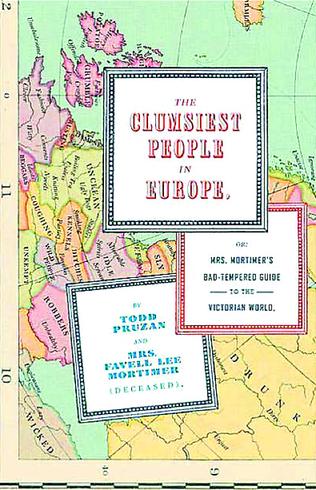The book was inspired by a bit of fortuitous browsing. While vacationing in Martha’s Vineyard one summer, Pruzan wandered through the vintage section of a bookstore housed in an old barn, where he noticed The Countries of Europe Described. Mildly curious, he opened it to find a scornful description of German women. Noting that they can knit, cook or play piano, it also said, “they are not fond of reading useful books. When they read, it is novels about people who have never lived. It would be better to read nothing than such books.”
The remainder of the book was filled with equally hostile remarks about other nations. The Portuguese were “indolent, like the Spaniards.” And, one of the more baffling remarks: “I think it would almost make you sick to go to church in Iceland.”
Stunned by what he calls a “vicious, systematic country-by-country savaging of the entire world,” Pruzan set out to find the author of the book, who was described on the title page only as “the Author of The Peep of Day.”
Starting as any modern researcher would, Pruzan turned to Google. He quickly learned that The Peep of Day was an 1833 Bible primer for children written by Favell Lee Mortimer. The author of 16 books in her career, Mortimer also published three so-called travel books describing the nations of the world, despite the fact that she had left England only once before then, as a teen, to visit Brussels and Paris with her family.
Yet Mrs. Mortimer wrote about the world as if she had been there. For example, her description of Sweden contains details that lead one to believe she had seen it herself: “In the south of Sweden the cottages are uncomfortable. They are so small, that, to make more room, the beds are placed one above the other, and you must climb up to the top bed, and when there, take care not to fall out. As you go along the road you will observe broken windows, unswept yards, torn thatch. … But in the north there are many pretty neat villages—where all the cottage windows are furnished with muslin blinds and are adorned with gay flower-pots.”
It is this authoritative writing style that left an impression on Pruzan. He recognized that, although most of Mrs. Mortimer’s books went out of print last century, she was well-known in her time, thus influencing Victorian children who grew up reading her books, forming opinions of the rest of the world from her work.
The Clumsiest People in Europe is the result of a couple years of research into Mrs. Mortimer’s life and writing. It begins with an introduction by Pruzan describing how he discovered Mrs. Mortimer’s writing, his efforts to research her past and cute anecdotes about what he found. The rest of the book is essentially a republishing of Mrs. Mortimer’s travel books, although it is edited by Pruzan to cut fluff and revisions. He also writes, at the beginning of each nation’s entry, a paragraph explaining the condition of the nation in the late 1800s, to provide some historical context for the reader.
The juxtaposition of Pruzan’s research with Mrs. Mortimer’s pronouncements on the flaws of each nation results in an educational, and often amusing, look at how people judge others. Thankfully, Pruzan was not tempted to apply the typical heavy-handed critique to Mrs. Mortimer’s work. He lets her writing show its own biases, which is a far more effective method for demonstrating how her attitude influenced her opinions.
In an interview, Pruzan said that Mrs. Mortimer probably did not make up her descriptions of each nation from raw imagination. A biography written in 1901 said that she relied on books, which were probably geographic texts and religious tracts about missionary expeditions. Pruzan also notes that Mrs. Mortimer “had access to acquaintances who had been in far-flung places, for military, missionary or business purposes, and seems to have drawn on their anecdotes for her writing as well.”
One such anecdote in the book illustrates perfectly Mrs. Mortimer’s simplistic views of the world and obvious preference for all things English. She tells the story of an English woman on a ship who encountered a Greek woman in despair because her daughter was throwing temper tantrums. “The English lady tried to quiet the naughty child by giving her cakes and sugar-plums. This plan succeeded. If the child had not been spoiled ever since she was a baby, she would not have been so willful and passionate at seven years old.” According to Mrs. Mortimer, this is evidence that the Greeks do not know how to raise children properly.
Of course, the fact that someone could find something nasty to say about every nation in the world is an instructive fact on its own.









